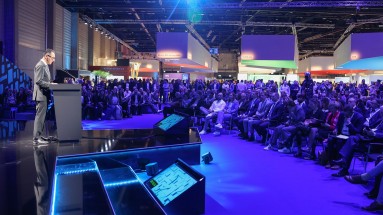Page content
Digital ideas for everyone: from model project to marketplace

In his keynote speech, Federal Minister of Agriculture Cem Özdemir explains how rural regions develop digital strategies - and how others benefit from them.
More than one in two people in Germany live in rural areas and 46% of gross value added is generated in these regions. However, when asked about the state of smart services of general interest in rural areas, “you instinctively cringe”, admitted Federal Minister of Agriculture Cem Özdemir during his keynote speech at the Smart Country Convention. Nevertheless, he once passed the question on to an AI. The result was then relatively balanced: Germany had made progress in recent years - for example in broadband coverage or educational technologies - but still had “room for improvement” before achieving nationwide coverage.
In fact, there is still an urban-rural divide, Özdemir continued. For example, 87% of households in cities are now connected to broadband, compared to only 61% in rural areas - which is why the German government decided in 2023 to “put rural regions on the fast lane”. After all, equal living conditions in urban and rural areas are “indispensable for social cohesion”, even more so as “we are currently facing increasing polarization”. And digitalization remains “the key issue for the future”.
“Pilot projects must be rolled out across the board”
The Federal Ministry of Agriculture is therefore not only funding numerous digitalization projects with its Rural Development and Regional Value Creation program but has also set up a digital marketplace so that districts and municipalities can learn from the best ideas and learn from each other. “Pilot projects must be rolled out on a broad scale,” said Özdemir. “Why should one district struggle with a problem when another has already found a solution?”
The “Smarte.Land.Regionen” model project of the Federal Ministry of Food and Agriculture (BMEL) collects best practice examples from the model regions. According to Özdemir, 56 listed solutions with 33 participating municipalities can currently be found there: “There is a fairly high probability that you can find the right service for you in this marketplace and that another municipality has already found answers to the most pressing questions.”
Networking between municipalities and districts
Every region has its own potential, history and challenges, Özdemir continued. “We want to explicitly take this diversity into account.” However, all users of the marketplace would become part of the network and the exchange, because: “Changes can rarely be managed in isolation and alone.” That is why it is also important to always think about urban and rural areas together, “because both need each other”. In the future, the digital marketplace will also be used for smart city solutions.
Become an exhibitor at #SCCON25
As a driving force for the future of digital administration and for equal digital living and working conditions in cities and rural areas, the Smart Country Convention is a must for all stakeholders who actively advance the digital transformation. Are you interested in advancing the digitization of our cities and municipalities too? Join us and position your company or municipality as an expert in digitalization in the public sector.



